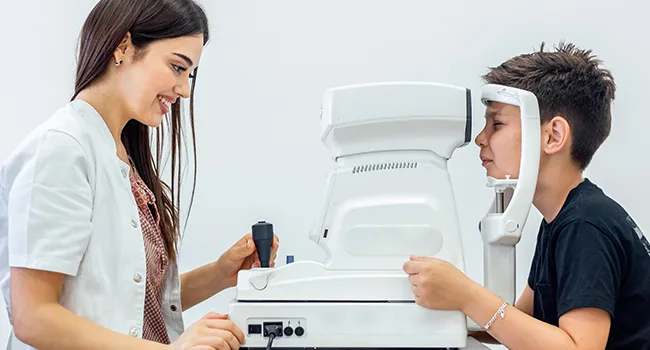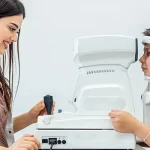All of us know that the visual needs of children are entirely different from adults. Since they are rapidly growing and are yet to develop a fully functional eye and brain coordination, ocular diseases in children require special attention and focus. This is precisely why a pediatric ophthalmologist is needed. But before we start the discussion on why a pediatric ophthalmologist is required for the eye needs of the children, let’s have a look at the definition of a pediatric ophthalmologist.
According to a standard definition, a pediatric ophthalmologist is an eye doctor who specialises in looking after and managing ocular diseases faced by children. They take care of both function and structure of the eyes and are qualified to undertake surgical treatment along with suggesting eye care measures such as usage of eyeglasses or eye medications. In the modern world, the field of pediatric ophthalmology has developed not only as a separate discipline but instead as a subspecialty in the area of eye care.
What are the eye ailments that affect children?
Some of the ocular ailments that impact children are-
- Infections like conjunctivitis
- Strabismus or squint eye treatment
- Blocked tear ducts
- Ptosis
- Abnormal vision development
- Retinopathy of prematurity
- Amblyopia
- Convergence insufficiency
- Congenital malformations
- Refractive errors such as myopia, hyperopia, astigmatism, etc.
What are the symptoms of ocular ailments in the case of children?
A common struggle that young children face is the problem of reading or writing. For example, a child suffering from an ocular disease might find it tough to read anything that has been written on a blackboard. The child can also find it tough to write properly in their notebooks. Also, it is always easier to notice any sort of physical symptoms such as a squint in the eyes, misaligned eyes, drooping eyelids or any kind of physical deformity around the eyes. Apart from this, regular and severe headaches are also a sign of an underlying ocular disease.
Another prominent symptom of ocular disease is the child’s susceptibility to varied forms of eye infections at frequent intervals of time. Apart from this, ocular diseases can be genetic and can be passed on from one generation to another.
How does a child’s eye differ from us?
The eyes of a child need special care and attention as they are entirely different from those in adults. The reasons for this are as follows:
- The brain-eye connections are not fully established at young ages and hence any deprivation of vision in early childhood, if it remains uncorrected, can result in lazy eye or amblyopia. This means that the visual potential of a child becomes limited, and even proper corrective glasses cannot help in later years.
- The hereditary disorders of development start showing up in the early years of life and can range from refractive errors which merely require corrective glasses, to squint or even misaligned eyes. Other forms of genetic diseases can include congenital nasolacrimal duct block, ptosis or lid droop and even cataract and glaucoma.
- In the case of premature infants, or those suffering from other considerations like low birth weight are at a higher risk of developing a disease called Retinopathy of Prematurity, (RoP). It should be noted that RoP is potentially vision-threatening and must be screened for in the early stages of life.
- A child suffering from malnutrition, and suffering from a deficiency of Vitamin A is often a potential target of ocular diseases like dry eye, corneal ulcers, and even blindness. Children who are fussy and picky eaters may also sometimes be deficient in some micronutrients despite being healthy and well-fed otherwise.
- Eye allergies can also impact young children because of their active lifestyle, such as playing outdoors continuously without proper rest to eyes. Increased screen time, like TV and video games, has also given rise to varied types of eye ailments.
Why choose Centre for Sight for your kid’s eyes?
Centre for Sight has a dedicated team of doctors who specialise in pediatric ophthalmology. Our experts offer regular checkups and plan the best treatments for your kid’s eyes by leveraging modern, state of the art technology. We are adept at handling varied eye diseases that impact children from simple issues like squint to more complex ailments such as congenital malformations.
For more information or expert pediatric eye care, get in touch with us today.
Article: Are you looking for a pediatric ophthalmologist? You have reached the right place.
Author: CFS Editorial Team | Oct 11 2020 | UPDATED 01:15 IST
*The views expressed here are solely those of the author in his private capacity and do not in any way represent the views of Centre for Sight.





